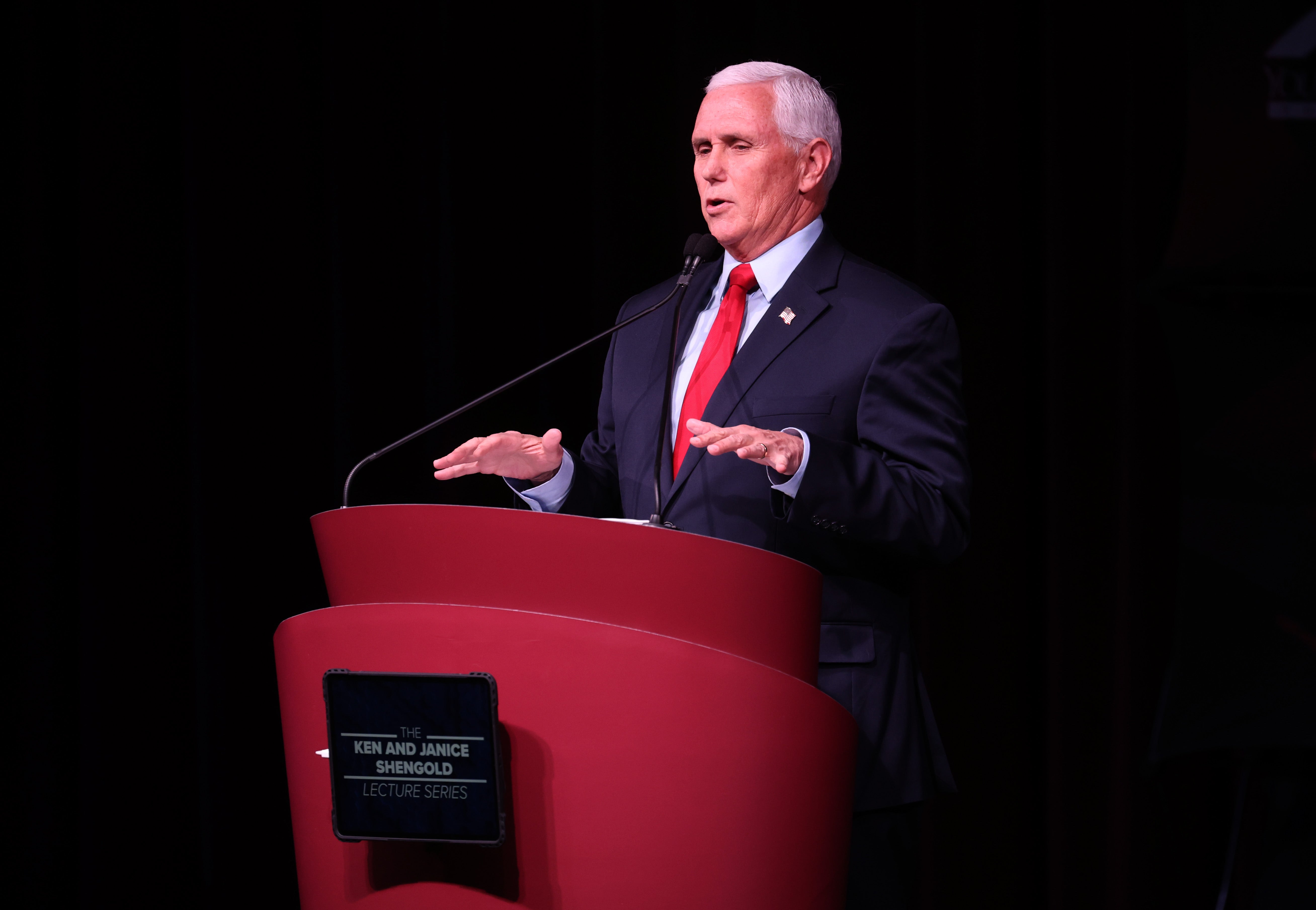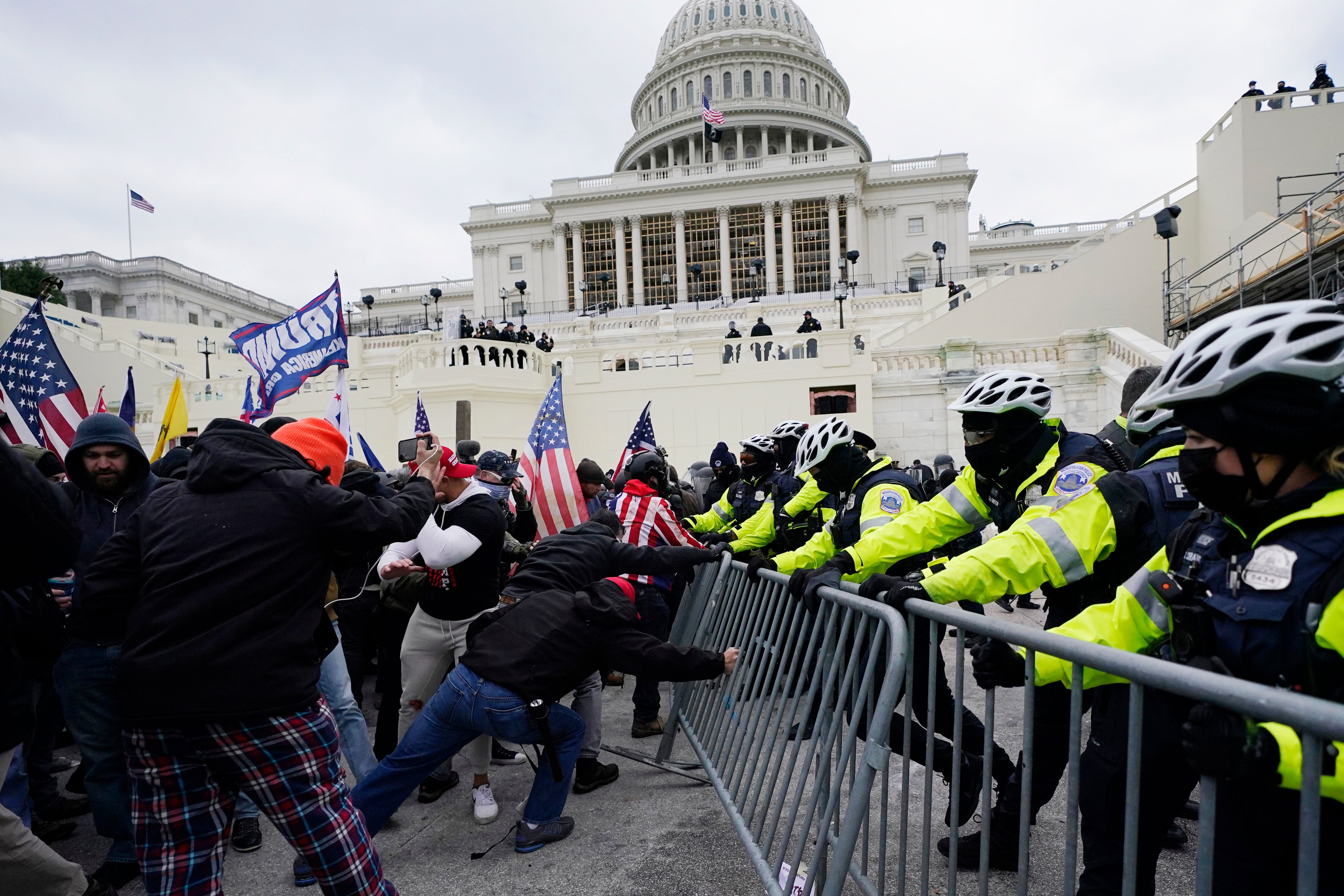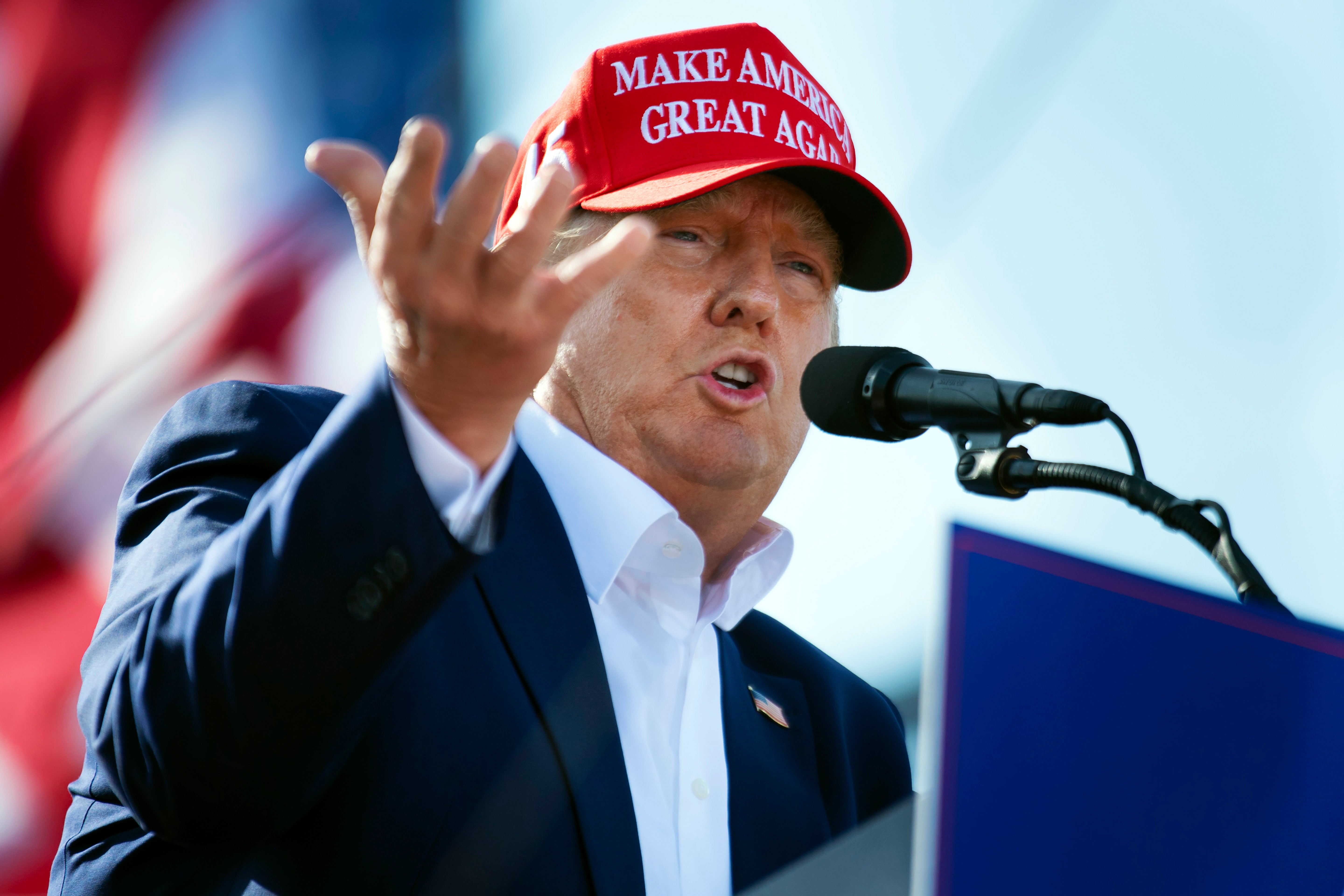What Mike Pence has said about the January 6 riot
Ex-vice president remains at odds with Donald Trump over Capitol insurrection, when violent mob threatened to hang him for failing to co-operate with plot to overturn election
Your support helps us to tell the story
From reproductive rights to climate change to Big Tech, The Independent is on the ground when the story is developing. Whether it's investigating the financials of Elon Musk's pro-Trump PAC or producing our latest documentary, 'The A Word', which shines a light on the American women fighting for reproductive rights, we know how important it is to parse out the facts from the messaging.
At such a critical moment in US history, we need reporters on the ground. Your donation allows us to keep sending journalists to speak to both sides of the story.
The Independent is trusted by Americans across the entire political spectrum. And unlike many other quality news outlets, we choose not to lock Americans out of our reporting and analysis with paywalls. We believe quality journalism should be available to everyone, paid for by those who can afford it.
Your support makes all the difference.The House Select Committee on the January 6 Attack is about to hold its final hearing over the attempted insurrection at the US Capitol in 2021, mounted by supporters of 45th president Donald Trump determined to overturn the results of the 2020 election.
The panel, chaired by Democratic congressman Bennie Thompson, has already reviewed 130,000 documents and interviewed over 1,000 witnesses, including integral members of Mr Trump’s inner circle, about precisely what happened on 6 January 2021, a date to live in infamy on which five people were killed as a violent mob, geed up by their candidate’s false election fraud narrative, smashed through security barriers and stormed the legislative complex.
Two men who have been central to the discussion are, of course, Mr Trump and his estranged former vice president Mike Pence.
Having lost the electoral vote on 3 November 2020 to Democrat Joe Biden by 306 to 232 and the popular vote by 81.3m ballots to 74.2m, Mr Trump immediately and baselessly began to insist the contest had been “rigged” in a vast nationwide conspiracy orchestrated by his opponents, a fallacy he has kept up ever since.
Two months of farcical legal proceedings led by the outgoing president’s personal attorney, former New York City mayor Rudy Giuliani had concluded with Mr Trump’s allies entirely failing to prove his bogus allegations, although his base remained unshakeable in its conviction that the vote had indeed been “stolen”.
Increasingly desperate, the president began to pile pressure on his own deputy, Mr Pence, whom he implored to use his position overseeing a joint-session of Congress on 6 January to render the election results null and void, keeping the heat on his ally with a series of tweets and in person on the campaign trail.
“I hope Mike Pence comes through for us,” Mr Trump said, stumping for Republican Senate runoff candidates David Perdue and Kelly Loeffler in Georgia. “I hope our great vice president comes through for us. He’s a great guy. Of course, if he doesn’t come through, I won’t like him very much.”
Mr Pence refused to oblige, writing a letter to Congress in which he explained: “I do not believe that the founders of our country intended to invest the vice president with unilateral authority to decide which electoral votes should be counted during the joint session of Congress, and no vice president in American history has ever asserted such authority.”
On the day itself, as the elected representatives convened to ratify the results, Mr Trump, Mr Giuliani and other MAGA luminaries addressed a rally organised by the “Stop the Steal” movement in Washington, DC, in which the president told his followers to “fight like hell” and beseeched them to march on the Capitol, pledging to join them before slinking off back to the White House instead to watch the carnage unfold on TV.
The rest is history and for the committee to determine in its forthcoming report, due for publication after November’s midterms, suffice to say that Mr Trump’s mob, whose number included armed members of far-right groups like the Proud Boys, the Oath Keepers and QAnon, came uncomfortably close to confronting Mr Pence and other lawmakers opposed to their misguided cause like Nancy Pelosi, Chuck Schumer and Mitt Romney after forcing their way through the barricades.
So incensed were the would-be insurrections by Mr Pence’s refusal to support Mr Trump that they called for his hanging on the National Mall and even erected a gallows before order could be restored later that evening, as a shocked world looked on.

“To those who wreaked havoc in our Capitol today: you did not win,” Mr Pence said in the aftermath.
“Violence never wins. Freedom wins. And this is still the people’s house. And as we reconvene in this chamber the world will again witness the resilience and strength of our democracy.”
His justifiably indignant tone stood in sharp contrast to that of the president, who issued a number of tweets that day calling on his supporters to “Stay peaceful!” and respect law enforcement before appearing in a hastily shot, somewhat reluctant video from the White House Rose Garden in which, without admitting he had been wrong, he urged his “great patriots” to go home, telling them: “We love you. You’re very special.”
The former running -mates would not speak for several days after 6 January but did eventually hold clear-the-air talks on 11 January that would expose how far apart the two men stood in their attitudes to what had unfolded.
Mr Trump had never once inquired about the wellbeing of Mr Pence and his family after the ordeal they had been exposed to and their relationship would never recover.
Since leaving DC after attending President Biden’s inauguration, an event at which he covered for Mr Trump for the final time, Mr Pence has kept busy, joining the conservative think tanks the Heritage Foundation and the Young America’s Foundation, travelling abroad, making endorsement speeches on behalf of preferred Republican candidates and working on a pair of books.

The House committee hearings have heard from a number of people formerly close to Mr Pence, including retired federal judge J Michael Luttig, his chief lawyer at the time of the riot Greg Jacob and his ex-aide Cassidy Hutchinson, although not the man himself.
That said, the ex-veep has gradually begun to be more forthcoming about the thwarted insurrection over time.
“That day, 6 January, was a dark day in the history of the United States Capitol,” he told a Republican dinner in New Hampshire in June 2021.
“But thanks to the swift action of the Capitol police and federal law enforcement, violence was quelled. The Capitol was secured. And that same day, we reconvened the Congress and did our duty under the constitution and the laws of the United States.”
He concluded by saying: “You know, President Trump and I have spoken many times since we left office. And I don’t know if we’ll ever see eye to eye on that day.”
Speaking to Sean Hannity of Fox News the following October, Mr Pence said of his former boss: “Look, you can’t spend almost five years in a political foxhole with somebody without developing a strong relationship.
“And, you know, 6 January was a tragic day in the history of our Capitol Building. But thanks to the efforts of Capitol Hill Police, federal officials, the Capitol was secured. We finished our work, and the president and I sat down a few days later and talked through all of it.”
He also issued a distinctly Trumpian attack on the press, commenting: “I know the media wants to distract from the Biden administration’s failed agenda by focusing on one day in January.
“They want to use that one day to try and demean the character and intentions of 74 million Americans who believed we could be strong again and prosperous again and supported our administration in 2016 and 2020.
“But for our part, I truly believe we all ought to remain completely focused on the future. That’s where I’m focused and I believe the future is bright.”
Those comments drew plenty of criticism, not least from people astonished that the former veep was apparently happy to continue to toe the party line even after a serious threat had been made against his own life.
By February 2022, perhaps with one eye on a possible run for the presidency himself within two years, Mr Pence began to change his attitude towards Mr Trump.

He told the conservative Federalist Society: “I had no right to overturn the election. The presidency belongs to the American people and the American people alone. And frankly, there is no idea more un-American than the notion that any one person could choose the American president.”
Furious, Mr Trump hit back, insisting in a statement that Mr Pence could have “sent back” the election results and argued that the House investigators should be probing Mr Pence more closely.
Later that month, following the outbreak of Russia’s unjust invasion of Ukraine, the ex-Indiana governor again broke with Mr Trump to tell Republican donors congregating in New Orleans that “there is no room in this party for apologists for Vladimir Putin”.
This was seemingly a nod to the former president’s admiration for the Kremlin leader, whom he had called a “genius” and whose denials of election meddling in 2016 he had accepted at face value at the Helsinki summit of July 2018, publicly favouring Mr Putin’s version of events over that of his own intelligence officials.
Most recently, Mr Pence has broken with Mr Trump once again by backing Georgia governor Brian Kemp and hinted in an interview with The New York Times that he could run for the presidency himself in 2024, saying that prayer will guide his decision-making.
For his part, Mr Trump has sneered at the prospect of a challenge from Mr Pence and indicated that his base would not permit a second Trump-Pence ticket, even if their damaged relationship could be repaired.




Join our commenting forum
Join thought-provoking conversations, follow other Independent readers and see their replies
Comments